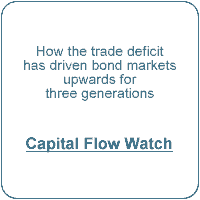Flow of Funds: Overview of the Corporate Bond Market
Corporate Bonds
Negotiable debt instruments of companies
Over the last quarter of a century, the market for corporate and foreign bonds has benefited from new products such as asset-backed securities and Brady bonds.

With deindustrialization and asset-lite management, bonds issued by asset-backed security sponsors and finance companies have come to represent a large part of the market.
Bond buyers include foreign investors, life insurance companies, commercial banks, and households.
Bonds Have Special Risks
Most bonds do not have indexed face value and offer little or no protection against inflation.
However, institutions that have non-indexed liabilities (like insurance companies and defined-benefit pension plans), find that bonds are reasonable long-term investments, especially when equities become over-priced.
Bonds are subject to interest rate risk, call and prepayment risk, default or credit risk, liquidity risk, exchange rate or currency risk, and inflation or purchasing power risk.
U.S. corporate bonds do not have the tax advantages of municipal bonds or the credit guarantee of U.S. government bonds.
Through the use of currency and interest rate derivatives, diversification, credit insurance, and other techniques, bond portfolio risk can be reduced.
Bonds Are Traded Over-The-Counter
Unlike stocks, bonds are usually traded by dealers over-the-counter.
-
Most trading is between institutions.
-
Compared to stock exchanges, bond markets lack transparency.
-
As a dealer's market, bonds have high transaction cost.
Systems now permit individual investors to enter the bond market online at reasonable cost.
Bond Issuers Must Pay For Ratings
Standard & Poor's, Moody's Investor Service, and Fitch Investors Service rate the credit risk of bonds.
Originally, information on bond ratings was sold to investors, but when regulators began to stipulate that insurance companies and institutional investors could only hold bonds with ratings from these agencies, bond raters began to charge issuers rather than investors.
Now ratings are free at the public library and online.
